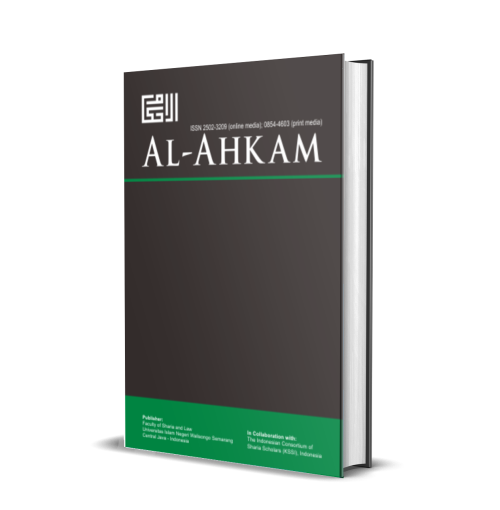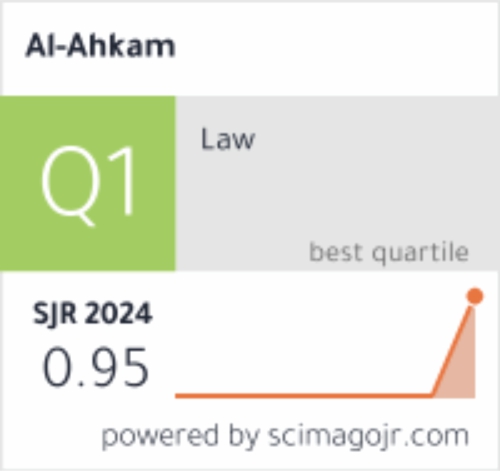Navigating Family Relationships to Political Choice: The Role of the Head of Muslim Household as Agency
DOI:
https://doi.org/10.21580/ahkam.2024.34.2.21478Keywords:
head of family, navigation, political choicesAbstract
In the context of family law, fathers play an essential role as the head of the family and the decision-maker who directs the family in various aspects, including decisions related to social and political interests. This study aims to describe the role of household heads as active agents in influencing family political choices. This research uses mixed methods to analyze the role of Muslim household heads in making political choices in the Luwu Raya region, South Sulawesi Province, Indonesia. Data were collected from 30 informants in the Luwu Raya regions using purposive sampling. Data in the form of interview documents, coded in several categories and then reduced according to the needs of the problem formulation. In addition to qualitative data, quantitative data percentages were also used to map political preferences, which were presented as diagrams. Finally, the data was narrated and interpreted to reach the right conclusion. The results show that the head of the family plays a role in shaping the political preferences of his family members by conducting more intense communication and persuasion. On the other hand, some family members have different political preferences due to their education and political experience.Downloads
References
A. Gani, Iskandar, Romi Asmara, Sulaiman Sulaiman, and Asmaul Husna. “The Constitutional Court’s Protection and Fulfilment of the Citizens’ Rights: Constitutional and Islamic Law Perspectives.” Samarah: Jurnal Hukum Keluarga dan Hukum Islam 8, no. 1 (2024): 317–38. https://doi.org/10.22373/sjhk.v8i1.22215.
Adcox, Susan. “When Families Disagree about Politics.” Better Conflict Bulletin, 2022. https://www.betterconflictbulletin.org/p/better-conflict-bulletin-2.
Afandi, M. Haikel, Jumni Nelli, and Mohd. Yunus. “An Examination of Islamic Family Law in Kampar Regency, Riau: Focusing on the Causes and Prevalence of Divorce in the Community.” el-Usrah: Jurnal Hukum Keluarga 6, no. 2 (2023): 298. https://doi.org/10.22373/ujhk.v6i2.19089.
Aji, Ahmad Mukri, and Nur Rohim Yunus. “Identity Politics in Cultural and Structural Islam in Indonesia.” Ahkam: Jurnal Ilmu Syariah 19, no. 1 (2019): 127–40. https://doi.org/10.15408/ajis.v19i1.10860.
Alam, Syariful, Sholahuddin al-Fatih, and Merve Ozkan Borsa. “Islamism and The Challenge of Democratization in Indonesia.” De Jure: Jurnal Hukum dan Syar’iah 15, no. 2 (2023): 198–213. https://doi.org/10.18860/j-fsh.v15i2.23398.
Amanda, Hanifa Triyuli, Irzal Anderson, and Kuswanto Kuswanto. “Analisis Hubungan Kekeluargaan dalam Perilaku Politik Masyarakat pada Pemilihan Kepala Desa Aro Tahun 2022.” Academy of Education Journal 15, no. 1 (2024): 365–72. https://doi.org/10.47200/aoej.v15i1.2199.
Ashsubli, Muhammad. “Perspektif Hukum Islam terhadap Pencalonan Diri dan Kampanye untuk Jabatan Politik.” JURIS (Jurnal Ilmiah Syariah) 15, no. 1 (2017): 11–20. https://doi.org/10.31958/juris.v15i1.484.
Baptist, Joyce, and Raeann R. Hamon. “Family Systems Theory.” In Sourcebook of Family Theories and Methodologies, 209–26. Cham: Springer International Publishing, 2022. https://doi.org/10.1007/978-3-030-92002-9_14.
Beck, Paul Allen, and M. Kent Jennings. “Pathways to Participation.” American Political Science Review 76, no. 1 (1982): 94–108. https://doi.org/10.2307/1960445.
Cholil, Mufidah. Psikologi Keluarga Islam Berwawasan Gender. Malang: UIN Maliki Press, 2008.
Conover, Pamela Johnston, and Donald D. Searing. “A Politics Socialization Perspective.” In Rediscovering the Democratic Purposes of Education, edited by Lorraine McDonnell, P. Michael Timpane, and Roger W. Benjamin, 91–124. Lawrence: University Press of Kansas, 2000.
Cooperman, Alan. “Most U.S. Parents Pass along Their Religion and Politics to Their Children.” Pew Research Center, 2023. https://www.pewresearch.org/short-reads/2023/05/10/most-us-parents-pass-along-their-religion-and-politics-to-their-children/.
Creswell, John W. Research Design Qualitative, Quantitative and Mixed Methods Approaches. 4th ed. Thousand Oaks: SAGE Pubications, Inc., 2014.
Dalton, Russel J. “The Pathways of Parental Socialization.” American Politics Quarterly 10, no. 2 (1982): 139–57. https://doi.org/10.1177/004478082010002001.
Daradjat, Zakiah. Ilmu Pendidikan Islam. Jakarta: Bumi Aksara, 2008.
Davies, James C. “The Family’s Role in Political Socialization.” The Annals of the American Academy of Political and Social Science 361, no. 1 (1965): 10–19. https://doi.org/10.1177/000271626536100102.
Dennis, Jack, and Diana Owen. “The Partisanship Puzzle: Identification and Attitudes of Generation X.” In After the Boom, edited by Stephen C. Craig and Stephen Earl Bennet, 43–62. Lanham: Rowman & Littlefield, 1997.
Dewi, Kartika Sari, and Adriana Soekandar Ginanjar. “Peranan Faktor-faktor Interaksional dalam Perspektif Teori Sistem Keluarga terhadap Kesejahteraan Keluarga.” Jurnal Psikologi 18, no. 2 (2019): 245–63. https://doi.org/10.14710/jp.18.2.245-263.
Fadhil, Rahmad, Ubaidullah Ubaidullah, and Iqbal Ahmady. “Peran Tokoh Agama dalam Membangun Partisipasi Politik Masyarakat Kabupaten Aceh Barat Daya pada Pemilu 2019.” Jurnal Ilmiah Mahasiswa (JIM) FISIP Universitas Syiah Kuala 7, no. 1 (2022). https://jim.usk.ac.id/FISIP/article/view/18411.
Haris, Munawir. “Situasi Politik Pemerintahan Dinasti Umayyah dan Abbasiyah.” Tasamuh: Jurnal Studi Islam 10, no. 2 (2018): 391–406. https://doi.org/10.47945/tasamuh.v10i2.79.
Hasyim, Muh Fathoni. “Literasi Politik Komunitas Samin di Bojonegoro dalam Pemilu Perspektif Fiqih Siyasah.” al-Manahij: Jurnal Kajian Hukum Islam 14, no. 2 (2020): 225–38. https://doi.org/10.24090/mnh.v14i2.3933.
Holbrook, Kenzie. “How Family and Religion Influence Young Adult Political Views.” The Daily Universee, 2020. https://universe.byu.edu/2020/10/30/how-family-and-religion-influence-young-adult-political-views/.
Hyman, Herbert Hiram. Political Socialization: A Study in the Psychology of Political Behavior. New York: Free Press, 1959.
Jakimowicz, Samantha, Lin Perry, and Joanne Lewis. “Bowen Family Systems Theory: Mapping a Framework to Support Critical Care Nurses’ Well‐being and Care Quality.” Nursing Philosophy 22, no. 2 (2021). https://doi.org/10.1111/nup.12320.
Kusmayadi, Rudy Catur Rohman. “Proses Pengambilan Keputusan dalam Keluarga.” Gender Equality: International Journal of Child and Gender Studies 3, no. 1 (2017): 1–10. https://jurnal.ar-raniry.ac.id/index.php/equality/article/view/1943.
Luscombe, Belinda. “Fighting With a Family Member Over Politics? Try These 4 Steps.” Time, 2021. https://time.com/5937398/how-to-talk-to-family-members-about-politics/.
Maimunah, Maimunah. “Politik Islam Perspektif Maqashid Syariah.” el-Mashlahah 8, no. 1 (2019): 16–29. https://doi.org/10.23971/el-mas.v8i1.1093.
Maranjaya, Abdul Kahar. “A Mechanism For Filling Regional Heads Positions In A Democratic Manner according to Pancasila Democracy’s Principle after the 1945 Constitution Amendments.” Syariah: Jurnal Hukum dan Pemikiran 21, no. 2 (2021): 227–49. https://jurnal.uin-antasari.ac.id/index.php/syariah/article/view/4870.
Martani, Sukmawati. “Pengaruh Keluarga terhadap Partisipasi Politik Pemilih Pemula Kelurahan Bugel Kabupaten Kulon Progo.” E-Civics 11, no. 2 (2022): 225–35.
Merelman, Richard M. “The Family and Political Socialization: Toward a Theory of Exchange.” The Journal of Politics 42, no. 2 (1980): 461–86. https://doi.org/10.2307/2130469.
Miles, Matthew B., A. Michael Huberman, and Johnny Saldana. Qualitative Data Analysis: A Methods Sourcebook. Jakarta: UI-Press, 2014.
Muslimin, JM. “Islamic Law in the Pancasila State.” Ahkam: Jurnal Ilmu Syariah 12, no. 1 (2012): 15–26. https://doi.org/10.15408/ajis.v12i1.976.
Nastain, Muhamad, Irwan Abdullah, Zuly Qodir, Hasse Jubba, and Bambang Cipto. “Cultural Barrier in the Regeneration Process of Islamic Political Party in Indonesia.” Jurnal Ilmiah Peuradeun 12, no. 2 (2024): 717–40. https://doi.org/10.26811/peuradeun.v12i2.1104.
Pradana, M. Gamma Fajar. “Kebijakan Pemerintahan John F. Kennedy di Amerika Serikat pada Tahun 1961-1963.” [Undergraduate Thesis]. Universitas Negeri Yogyakarta, 2014.
Pratiwi, Nuning Indah, I. Nyoman Darma Putra, Anak Agung Ngurah Anom Kumbara, and Ni Wayan Widhiasthini. “Political Communication and Capital toward Swing Voter Cause in Regional Head Elections 2020 in Karangasem Regency, Bali.” Jurnal Komunikasi: Malaysian Journal of Communication 40, no. 2 (2024): 380–94. https://doi.org/10.17576/JKMJC-2024-4002-22.
Purwosusanto, Hery. “Komunikasi Politik dalam Tafsir (Kajian atas ‘Tafhīm al-Qur’ān’ Karya Abū al-Aʿlā Mawdūdī).” Tajdid: Jurnal Ilmu Ushuluddin 16, no. 1 (2017): 55–70. https://doi.org/10.30631/tjd.v16i1.53.
Reissman, Hailey. “What Do Our Ancestral Family Ties Say about Our Political Beliefs? A New Study Finds that the Stronger Your Ancestral Family Ties, the More Likely You Are to Hold Right-Wing Cultural Policy Preferences.” Annenberg School for Communication, 2023. https://www.asc.upenn.edu/news-events/news/what-do-our-ancestral-family-ties-say-about-our-political-beliefs.
Saphir, Melissa Nichols, and Steven H. Chaffee. “Adolescents’ Contributions to Family Communication Patterns.” Human Communication Research 28, no. 1 (2002): 86–108. https://doi.org/10.1111/j.1468-2958.2002.tb00799.x.
Saragih, Glory Natalia. “Peran Keluarga dalam Sosialisasi Politik (Studi Deskriptif tentang Sosialisasi Pilihan pada Pilkada Simalungun Tahun 2016 pada Pemilih Pemula Batak Toba di Desa Nagori Bandar Kecamatan Bandar Kabupaten Simalungun).” [Undergraduate Thesis]. Universitas Sumatera Utara, 2018.
Smith, Tovia. “‘Dude, I’m Done’: When Politics Tears Families and Friendships Apart.” NPR Network, 2020. https://www.npr.org/2020/10/27/928209548/dude-i-m-done-when-politics-tears-families-and-friendships-apart.
Sorauf, Frank Joseph, and Paul Allen Beck. Party Politics in America. Northbrook: Scott Foresman, 1988.
“The Noble Quran: Translation - Saheeh International,” n.d. https://quran.com.
Turan, Erol, and Ozlem Tıras. “Family’s Impact on Individual’s Political Attitude and Behaviors.” International Journal of Psycho-Educational Sciences 6, no. 2 (2017): 103–10. https://eric.ed.gov/?id=EJ1254813.
Turhamun, Turhamun. “Desain Pesan Komunikasi Politik Perspektif Islam di Era 4.0.” Jurnal Penelitian Agama 23, no. 2 (2022): 281–95. https://doi.org/10.24090/jpa.v23i2.2022.pp281-295.
Wilson, R. Dale, and John W. Creswell. “Research Design: Qualitative and Quantitative Approaches.” Journal of Marketing Research 33, no. 2 (1996): 252. https://doi.org/10.2307/3152153.
Zainuddin, Zainuddin, Roni Efendi, Jamal Mirdad, and Salmy Edawati Yaacob. “Siyāsah Shar’iyyah and the Politicization of Religion in the 2019 Indonesian Presidential Election.” Ahkam: Jurnal Ilmu Syariah 22, no. 2 (2022): 357–84. https://journal.uinjkt.ac.id/index.php/ahkam/article/view/28165.
Downloads
Published
How to Cite
Issue
Section
License
Copyright (c) 2024 Al-Ahkam

This work is licensed under a Creative Commons Attribution-ShareAlike 4.0 International License.
By submitting an article to the journal, the author(s) agree to transfer the published article's copyright to the journal, which will act as the publisher. This means the journal will have the right to publish the article in various forms, including reprints. The journal will maintain the publishing rights to the published articles.
In line with the license, authors and third parties (readers, researchers, and others) are allowed to share and adapt the material. In addition, the material must be given appropriate credit, provided with a link to the license, and indicated if changes were made. If authors remix, transform or build upon the material, authors must distribute their contributions under the same license as the original.



